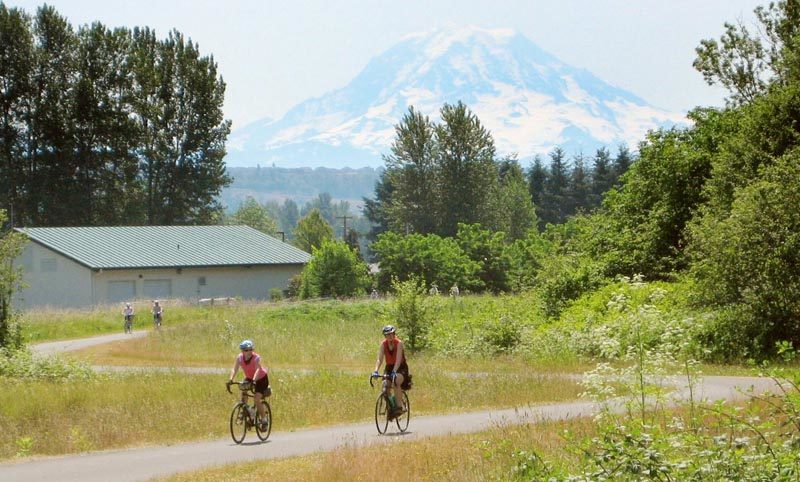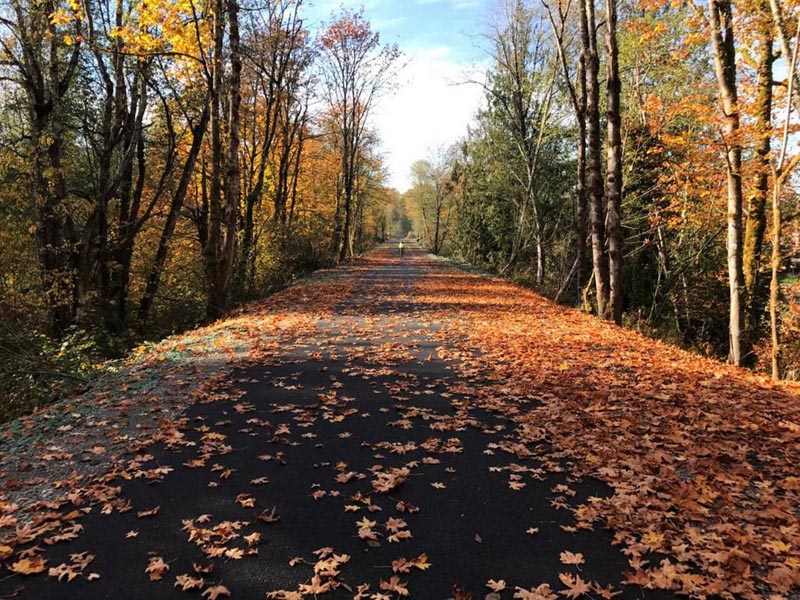Lockner v. Pierce County: how the legal concept of recreational immunity affects historic preservation

View of the Foothills Trail, a 15-mile, non-motorized paved path from Puyallup to Orting in east Pierce County.
By Alanna Peterson, Attorney, Pacifica Law Group, & Vice President, Washington Trust Board of Directors
Federal, state, and local government, landowners, and nonprofit organizations (such as the Washington Trust for Historic Preservation) work together to secure public access to and enjoyment of historic resources. One critical tool is the state’s recreational immunity statute, which encourages public and private landowners to open their land to outdoor recreation (which is defined broadly and includes viewing or enjoying historical or archaeological sites) by limiting landowners’ liability for unintentional injuries to the public. Last year, the Washington Supreme Court clarified to whom and in what circumstances the recreational immunity statute applies, but questions of importance to the historic preservation community remain.
The recreational immunity statute, RCW 4.24.210, promotes public access by shifting the risks of engaging in outdoor recreation from the landowner to the recreational user. While a landowner is generally obligated to keep visitors safe and warn them of potential dangers, if the recreational immunity statute applies, a visitor instead enters at their own risk and the landowner owes them only a duty to warn of certain hidden dangers and not to intentionally harm them. The recreational immunity statute applies broadly to any public or private landowner permitting public access to view or enjoy historical or archaeological sites (for example, public tours of a historic building or a public trail to a culturally significant site), as long as no fee is charged.

The Foothills Trail.
Although the concept behind the recreational immunity statute is relatively straightforward, its application by the courts is often far from it. For example, in Lockner v. Pierce County, a recreational user sued Pierce County after she fell riding her bike on the Foothills Trail, which is a rail-to-trail path maintained by the County’s parks department. The County argued that it was immune from the suit under the recreational immunity statute because the trail was open to the public, without charge, and for recreational purposes. The court of appeals (the intermediate branch of our state court system) disagreed. In reaching that decision, the court of appeals concluded that the recreational immunity statute applies only if (1) the landowner retains the authority to close their land to the public, and (2) the land is open to the public solely for the purpose of outdoor recreation and no other purpose (i.e., transportation).
The County asked the Washington Supreme Court (our state’s court of last resort) to review the court of appeals’ decision. The Washington Trust for Historic Preservation—along with other stakeholders, including land trusts and outdoor recreation organizations—filed an amicus curiae, or “friend of the court,” brief to identify for the Court the negative and far-reaching consequences that the court of appeals’ narrow interpretation of the recreational immunity statute would have on the diversity and accessibility of recreational opportunities in this state.
In a unanimous decision, the Washington Supreme Court reversed the court of appeals’ decision and held instead that the recreational immunity statute applies to Pierce County. In doing so, the Court clarified that the recreational immunity statute applies to all land held open to the public for recreational purposes, regardless of whether the land is also open to the public for other purposes. This is a significant victory for historic preservation in our state, of which public access is often only one of multiple beneficial uses that a historic resource may provide.
The Washington Supreme Court declined to decide, however, whether a landowner must retain the authority to close their land to the public for recreational immunity to be available, and that question remains open. This ambiguity has potential implications for historic resources to which public access is guaranteed or facilitated by legal agreements, such as preservation easements or grant agreements. Many funding sources (such as some transfer of development right programs and the Heritage Barn Grant program) require as a condition of approval that land be open to the public to some extent. Because the Washington Supreme Court declined to decide it, it is now up to the legislature or courts in future cases to resolve this issue. Both avenues will provide additional opportunities for the historic preservation community to work alongside other stakeholders to promote and facilitate public access to historic resources.
